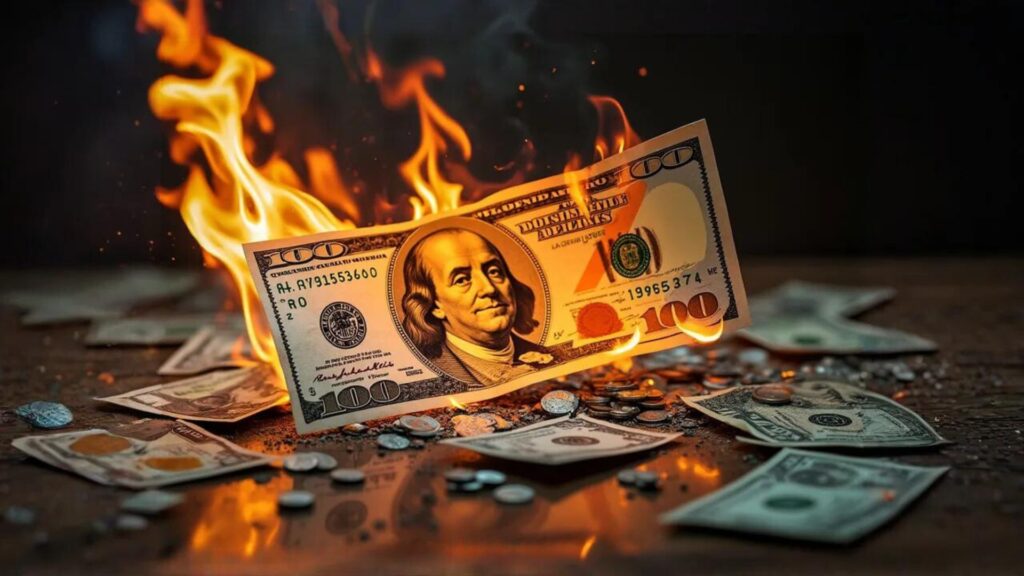Podcast Discussion: Deep Dive Into This Article.
As the global financial landscape undergoes significant shifts, BlackRock, the world’s largest asset manager, is preparing for what could be a seismic event in the global monetary system: a U.S. dollar crisis. This comes against a backdrop of ballooning federal debt, de-dollarization trends, and the rise of Bitcoin as a hedge against traditional financial system failures.
The Debt Crisis and U.S. Dollar Vulnerability
The U.S. national debt has reached an astonishing $35 trillion, a burden that places immense pressure on the Federal Reserve and the broader economy. While this growing debt has yet to cause immediate catastrophe, the U.S. dollar’s reserve currency status is seen as the last pillar propping it up. However, even this pillar is showing signs of strain due to shifts in global trade practices and geopolitical tensions.
The U.S. dollar’s reserve status is tied to its role in global trade, particularly in oil markets—commonly known as the “petrodollar system.” The dominance of the U.S. dollar has allowed America to effectively export its inflation and maintain a unique advantage in global economics. But as the world increasingly questions the reliability of the dollar, countries are looking for alternatives.
De-Dollarization and the Multipolar World
One key trend contributing to the U.S. dollar’s fragility is de-dollarization—a movement fuelled largely by U.S. foreign policy, sanctions, and economic coercion. Currently, one-third of all nations are under some form of U.S. sanctions, and 60% of the world’s poorest countries are similarly restricted. This weaponization of the dollar has spurred countries like Russia, China, and even members of BRICS to seek alternatives to the dollar-dominated financial system.
The rise of multipolarity is crucial to this shift. BRICS nations, as well as others, are developing and adopting new payment systems that bypass U.S. financial dominance, such as China’s CIPS (Cross-Border Interbank Payment System) and Russia’s SPFS (System for Transfer of Financial Messages), as well talks of a Blockchain based cross boarder settlement currency, directly challenging SWIFT, the dollar-based global messaging system. These moves are not merely about trade efficiency; they reflect a growing desire for independence from the U.S.-controlled financial infrastructure.

BlackRock’s Bitcoin Play: A Hedge Against the Collapse
Amid this growing uncertainty, BlackRock’s quiet yet strategic pivot toward Bitcoin speaks volumes. Bitcoin, with its fixed supply and decentralized nature, is increasingly viewed as a hedge against currency devaluation and potential economic fallout from a dollar collapse.
BlackRock’s exploration of Bitcoin reflects broader institutional interest, signalling that Bitcoin could move from being a speculative asset to a more critical component in portfolio diversification. Larry Fink, BlackRock’s CEO, has made waves by pushing for a Bitcoin ETF, which would give traditional investors an easier way to gain exposure to Bitcoin through regulated channels.
Why Bitcoin?
Bitcoin’s role as “digital gold” becomes clearer in light of several factors:
- Safe Haven Asset: Should the U.S. dollar face significant depreciation due to mounting debt and decreased global demand, Bitcoin, like gold, may act as a store of value. With Bitcoin’s fixed supply of 21 million coins, it offers a deflationary counterpoint to fiat currencies, which can be printed indefinitely.
- Institutional Adoption: BlackRock’s involvement brings further legitimacy to Bitcoin as an asset class. The entry of large financial institutions tends to attract additional capital, potentially sparking a Bitcoin price boom.
- Market Liquidity: If the Federal Reserve engages in quantitative easing to manage its debt crisis, the resulting influx of liquidity could flow into assets like Bitcoin, which are perceived to hold their value better than inflating fiat currencies.
- Global Financial Shift: The rise of Bitcoin could also be part of the larger de-dollarization trend. As countries seek alternatives to the U.S. dollar, Bitcoin could serve as a global reserve asset not tied to any one nation’s economic policies.

De-Dollarization’s Implications for the U.S. Dollar
The de-dollarization movement has profound implications for the future of the U.S. dollar:
- Reduced Demand for U.S. Dollars: As more countries engage in trade using their own currencies or digital assets, global demand for dollars will likely decrease. This could weaken the dollar’s value and its status as the world’s reserve currency.
- Inflationary Pressures: A weaker dollar could result in inflation within the U.S., pushing the Federal Reserve to raise interest rates to attract foreign capital.
The BlackRock-Bitcoin Connection
BlackRock’s potential embrace of Bitcoin seems to position the asset manager as preparing for the worst-case scenario—one in which the U.S. dollar loses its dominance. While Bitcoin may still be volatile, the strategic positioning of institutional investors like BlackRock suggests they see it as a hedge against not just inflation, but a broader collapse of trust in fiat currencies.
By preparing for a dollar crisis with Bitcoin as a key asset, BlackRock appears to be laying the groundwork for a new financial paradigm—one where digital currencies and decentralized assets hold a more significant role in global finance.

Disclaimer: This article reflects opinions based on available information up to September 20, 2024. It is not intended to provide financial advice. Please conduct further research or consult with a financial advisor before making investment decisions.



